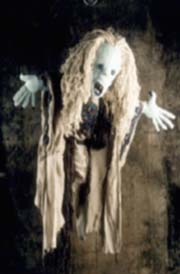|
|
|
Mark Herman on "Humor and Translation"
(ATA Chronicle,
April '95, p. 26)
Can word play be translated from one language into another?...
'Der Werwolf', in which the title character asks a ... schoolmaster to
grammatically decline him. The result is a sendup of German case
endings, in which, to achieve parallelism, the archaic 'wes' is substituted
for modern 'wessen': Der Werwolf, des Weswolfs, dem Wemwolf, den Wenwolf
[The who-wolf, the whose-wolf's, to the whom-wolf, the whom-wolf].
Alex Gross' translation depends on the fact that, while English nouns do
not take case endings as in German (other than possessives and plurals),
English verbs are conjugated and "were" is a form of "to be." His
corresponding English forms are: Werewolf, Waswolf, Amwolf, Iswolf, Arewolf...
THE WEREWOLFA Werewolf, troubled by his name,
Left wife and brood one night and came
To a hidden graveyard to enlist
The aid of a long-dead philologist."Oh sage, wake up, please don't berate me,"
He howled sadly, "Just conjugate me."
The seer arose a bit unsteady
Yawned twice, wheezed once, and then was ready."Well, `Werewolf' is your plural past,
While `Waswolf' is singularly cast:
There's `Amwolf' too, the present tense,
And `Iswolf,' `Arewolf' in this same sense.""I know that--I'm no mental cripple--
The future form and participle
Are what I crave," the beast replied.
The scholar paused--again he tried:"A `Will-be-wolf?' It's just too long:
`Shall-be-wolf?' `Has-been-wolf?' Utterly wrong!
Such words are wounds beyond all suture--
I'm sorry, but you have no future."The Werewolf knew better--his sons still slept
At home, and homewards now he crept,
Happy, humble, without apology
For such folly of philology.
[This translation is Copyright ©1957 & 1989
by Alexander Gross.]
 |
THE BANSHEE (An Approach) One night, a banshee slunk away
The village teacher climbed up straight
"The banSHEE, in the subject's place;
The banshee marveled at the cases
The teacher, though, admitted then
The banshee, rising clammily,
[Translation by Max Knight] |
- Some of Goethe's enlightening thoughts on Translation and Literary Adaptations can be found in Other Voices 2.2 , the (e)Journal of Cultural Criticism.
